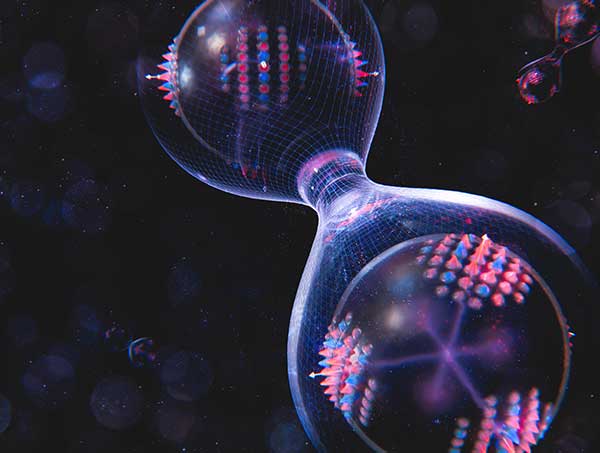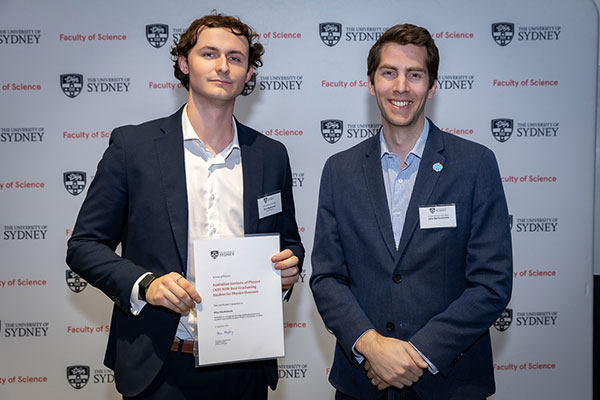Over the past quarter (Jul – Sep 2025), the Quantum Science Group has continued to build momentum through a series of impactful achievements. From landmark publications and competitive grants to student milestones and alumni-led innovation, here’s a snapshot of recent highlights from across the Quantum Science Group community.
Dr Dominic Williamson and collaborators had their paper on “Efficient Preparation of Solvable Anyons with Adaptive Quantum Circuits” published in PRX.
Dr Ting Rei Tan and his PhD student Vassili Matsos and the QCL team had their research on “Universal quantum gate set for Gottesman–Kitaev–Preskill logical qubits” published in Nature Physics and received some positive University press coverage.
Dr Ting Rei Tan, Dr Christophe Valahu and the QCL team had their research on “Quantum-enhanced multiparameter sensing in a single mode” published in Science Advances and received positive media coverage on Phys.org, The Conversation and Gizmodo.
Several members of the Group won National Intelligence Discovery Grants from the Office of National Intelligence, including Dr Robert Wolf and collaborators for their project on “Perceptive quantum sensors for infallible collection”; and
Dr John Bartholomew and collaborators for their project on “Superconducting quantum sensors based on emerging quantum materials”.
Dr Ting Rei Tan, Dr Xanthe Croot, Dr John Bartholomew and Dr Milos Rancic received Ignition Grants from the University’s Office of Global and Research Engagement. Ignition Grants are awarded to collaborative projects that develop multidisciplinary innovative research to create academic and societal impact. Read more here.
Dr Sahand Mahmoodian was appointed to a continuing position at the Institute of Photonics and Optical Science.
Prof Stephen Bartlett was named a finalist in the AmCham Alliance Awards 2025.

Artist’s impression of two entangled grid-state qubits. Credit: Emma Hyde
Our students have also made their mark this quarter, with a series of exciting milestones worth celebrating. Congratulations to:
Nouedyn Baspin (Quantum Theory Group) and Nick Fazio (Quantum Theory Group) whose PhDs were conferred.
PhD student Rebecca Radebold (Quantum Theory Group), who had her first paper on Explicit Instances of Quantum Tanner Codes (co-authored with Profs Stephen Bartlett and Andrew Doherty) published on ArXiv.
PhD student Luke English (Quantum Theory Group) who had his first paper on Thresholds for Postselected Quantum Error Correction from Statistical Mechanics published on Physics Review Letters.
Hons graduate Rhys Mackintosh (Quantum Theory Group) who won three prizes at the School of Physics Prize Night: the AIP NSW’s Prize for Best Graduating Student for Physics Honours, the Shiroki Prize for Best Honours Project in Physics, and the McKellar Prize for Research Excellence in Theoretical Physics.
And Hons student Angelia Liang (Quantum Integration Laboratory) who won the W I B Smith Prize in Physics.

Honours graduate Rhys Mackintosh (left), pictured with Dr John Bartholomew, received three awards at the recent School of Physics Prize Night. Credit: Jayne Ion
Beyond the Group itself, our alumni and their spin-off ventures are making significant strides — securing fellowships, forging strategic partnerships, and advancing quantum technologies in commercial and academic arenas.
Alice Jeffrey (QIL alumni) won a Quad fellowship to undertake her PhD in Applied Physics at CalTech https://www.caltech.edu/about/news/2025-quad-fellows
Iceberg Quantum – founded by Theory Group alumnus Felix Thomsen, Larry Cohen, and Sam Smith – has partnered with Diraq to accelerate the path to useful quantum computing with spin qubits. Read more.
Emergence Quantum – co-founded by current Group member Prof David Reilly– has partnered with IONQ to expand on existing advances in ion trap technology and co-develop next-generation electronics and materials. Read more.
Emergence Quantum has also won an Australia’s Economic Acceleration (AEA) Innovate Grant for its project, “Bringing Quantum Computing Into the Marketplace”. In collaboration with the University of Sydney, Emergence Quantum will pioneer scalable manufacturing and packaging of superconducting amplifiers for defence, intelligence and scientific applications as well as for a growing market from global technology companies and local startups. Read more.
Finally, as the Group continues to evolve, we’re pleased to welcome new faces and bid farewell to colleagues moving on to new chapters.
We welcomed honours students Angela Liang and Aidan Dugdale to QIL; as well as Yugo Takaka, who will be undertaking an internship with Prof Stephen Bartlett and Dr Dominic Williamson. We farewelled Dr Kun Zuo from QNL.
Thank you to all who contributed to this quarter’s momentum. As new projects take shape and partnerships are forged, the final stretch of 2026 is poised to be both productive and rewarding. We look forward to highlighting the Quantum Science Group’s continued achievements — individual and collective — in the next update.

